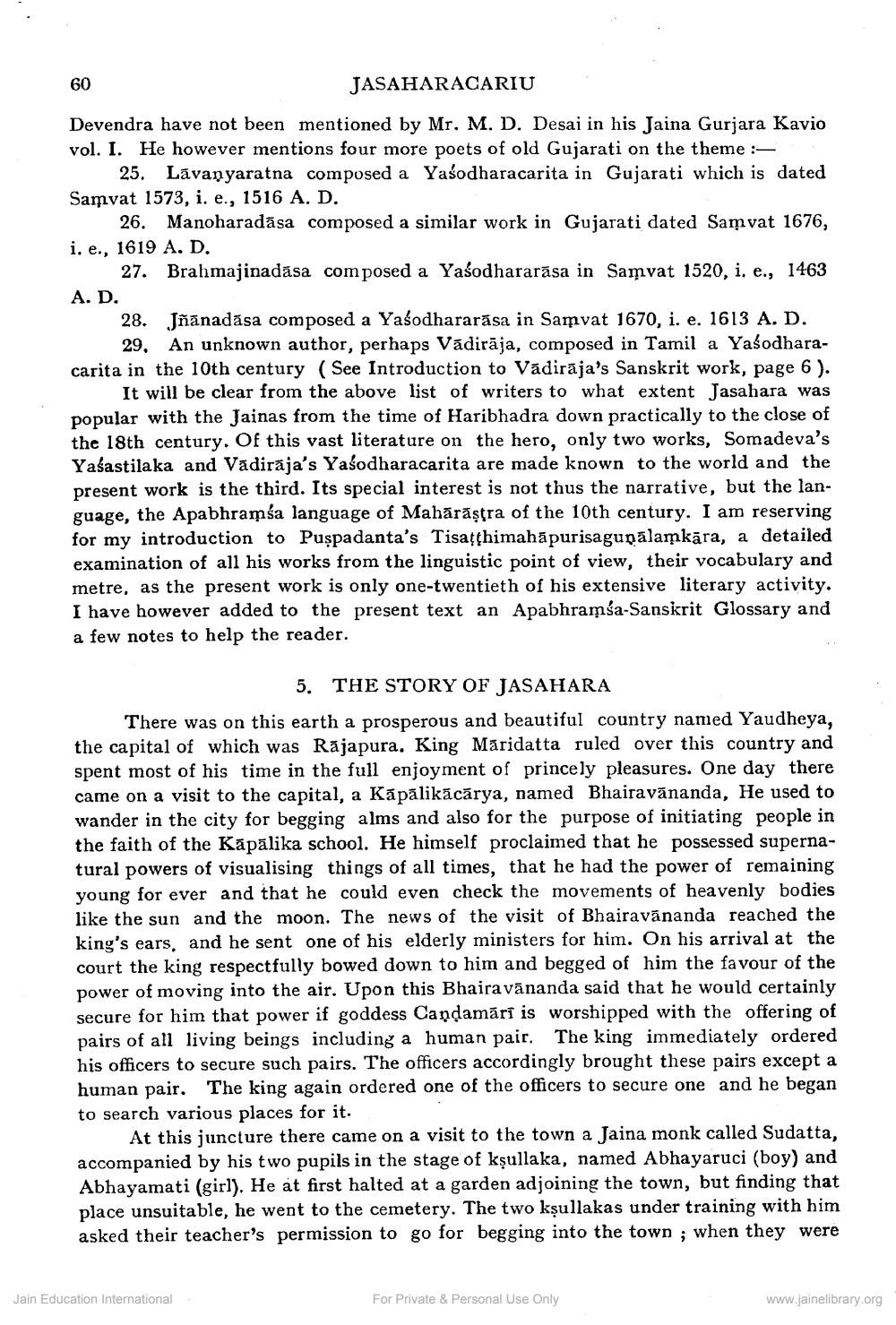________________
JASAHARACARIU
Devendra have not been mentioned by Mr. M. D. Desai in his Jaina Gurjara Kavio vol. I. He however mentions four more poets of old Gujarati on the theme :
60
25. Lavanyaratna composed a Yasodharacarita in Gujarati which is dated Samvat 1573, i. e., 1516 A. D.
26. Manoharadasa composed a similar work in Gujarati dated Samvat 1676, i. e., 1619 A. D.
27. Brahmajinadasa composed a Yasodhararāsa in Samvat 1520, i. e., 1463 A. D.
28.
Jñanadasa composed a Yasodhararasa in Samvat 1670, i. e. 1613 A. D. 29. An unknown author, perhaps Vadirāja, composed in Tamil a Yasodharacarita in the 10th century (See Introduction to Vadiraja's Sanskrit work, page 6).
It will be clear from the above list of writers to what extent Jasahara was popular with the Jainas from the time of Haribhadra down practically to the close of the 18th century. Of this vast literature on the hero, only two works, Somadeva's Yasastilaka and Vadiraja's Yasodharacarita are made known to the world and the present work is the third. Its special interest is not thus the narrative, but the language, the Apabhramsa language of Maharastra of the 10th century. I am reserving for my introduction to Puspadanta's Tisaṭṭhimahāpurisaguṇālamkāra, a detailed examination of all his works from the linguistic point of view, their vocabulary and metre, as the present work is only one-twentieth of his extensive literary activity. I have however added to the present text an Apabhramsa-Sanskrit Glossary and a few notes to help the reader.
5. THE STORY OF JASAHARA
There was on this earth a prosperous and beautiful country named Yaudheya, the capital of which was Rajapura. King Maridatta ruled over this country and spent most of his time in the full enjoyment of princely pleasures. One day there came on a visit to the capital, a Kāpālikācārya, named Bhairavananda, He used to wander in the city for begging alms and also for the purpose of initiating people in the faith of the Kāpālika school. He himself proclaimed that he possessed supernatural powers of visualising things of all times, that he had the power of remaining young for ever and that he could even check the movements of heavenly bodies like the sun and the moon. The news of the visit of Bhairavananda reached the king's ears, and he sent one of his elderly ministers for him. On his arrival at the court the king respectfully bowed down to him and begged of him the favour of the power of moving into the air. Upon this Bhairavananda said that he would certainly secure for him that power if goddess Candamārī is worshipped with the offering of pairs of all living beings including a human pair. The king immediately ordered his officers to secure such pairs. The officers accordingly brought these pairs except a human pair. The king again ordered one of the officers to secure one and he began to search various places for it.
At this juncture there came on a visit to the town a Jaina monk called Sudatta, accompanied by his two pupils in the stage of kṣullaka, named Abhayaruci (boy) and Abhayamati (girl). He at first halted at a garden adjoining the town, but finding that place unsuitable, he went to the cemetery. The two kṣullakas under training with him asked their teacher's permission to go for begging into the town ; when they were
Jain Education International
For Private & Personal Use Only
www.jainelibrary.org




